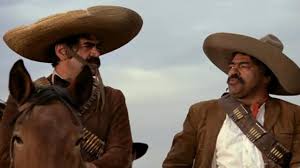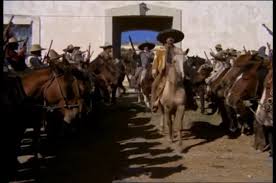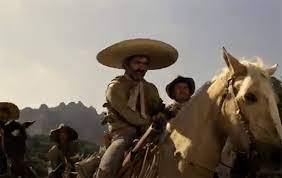🎬 Los de abajo (1977)

Los de abajo (1977) Review
Los de abajo, the 1977 adaptation of Mariano Azuela’s classic novel, brings the harrowing reality of the Mexican Revolution to life. Directed by Servando González, the film captures the struggle, chaos, and humanity of a pivotal moment in Mexican history. Through its raw storytelling and compelling performances, Los de abajo provides a visceral exploration of the lives of those caught in the crossfire of war.
Plot Overview
The story follows Demetrio Macías (portrayed by Eric del Castillo), a humble farmer whose peaceful existence is upended by the brutality of the revolution. Forced to flee his home after a violent encounter with federal troops, Demetrio becomes the reluctant leader of a band of rebels. Together, they fight against the oppressive forces of the government while grappling with the moral complexities of their cause.
As the narrative unfolds, Demetrio’s journey highlights the stark contrast between the idealism of the revolution and the harsh realities faced by its participants. The film’s episodic structure mirrors the disjointed and chaotic nature of the conflict, offering a ground-level view of its impact on ordinary people.
Performances
Eric del Castillo delivers a commanding performance as Demetrio Macías, embodying the character’s transformation from a simple farmer to a battle-hardened leader. His portrayal is both stoic and deeply human, capturing the internal struggle of a man forced to take up arms.
The supporting cast, including Salvador Sánchez as Venancio and Narciso Busquets as Luis Cervantes, adds depth to the story. Each character represents a different facet of the revolution, from the opportunistic intellectual to the loyal but disillusioned soldier. Their interactions with Demetrio provide a nuanced exploration of the revolution’s impact on individuals from diverse backgrounds.
Visuals and Cinematic Style
Servando González’s direction emphasizes the stark and unforgiving landscapes of rural Mexico, creating a visual metaphor for the harshness of the revolution. The film’s cinematography, marked by its use of natural light and rugged settings, lends authenticity to the narrative. Wide shots of barren deserts and crumbling villages underscore the desolation wrought by the conflict.
The battle scenes are gritty and unvarnished, eschewing Hollywood-style heroics in favor of a more realistic portrayal of violence. González’s focus on the personal toll of war, rather than grandiose spectacle, sets the film apart from other entries in the genre.
Themes and Emotional Core
At its heart, Los de abajo is a meditation on the futility and cost of war. It challenges romanticized notions of the revolution by presenting a more nuanced and grounded perspective. The film explores themes of loyalty, betrayal, and the erosion of idealism, painting a sobering portrait of a conflict that promised change but delivered devastation.
Demetrio’s arc encapsulates the emotional core of the story. His gradual disillusionment with the revolution mirrors the broader disillusionment experienced by many who fought in it. The film’s focus on the human cost of the conflict ensures that its message resonates beyond its historical context.
Strengths
- Authentic Performances: Eric del Castillo’s portrayal of Demetrio Macías anchors the film with emotional depth and authenticity.
- Gripping Realism: The film’s unflinching depiction of the violence and chaos of the revolution is both impactful and thought-provoking.
- Strong Thematic Focus: Los de abajo offers a compelling critique of war and its consequences, making it more than just a historical drama.
- Stunning Cinematography: The use of natural landscapes and lighting creates an immersive and visually striking experience.
Weaknesses
- Episodic Structure: While reflective of the source material, the disjointed narrative may feel fragmented to some viewers.
- Pacing Issues: The deliberate pacing can occasionally hinder the film’s momentum, particularly in its quieter moments.
- Limited Character Development: Some supporting characters, while well-acted, lack the depth needed to fully engage the audience.
Legacy and Impact
Los de abajo stands as a significant contribution to Mexican cinema and the genre of revolutionary films. By adapting Azuela’s seminal novel, it preserves an important piece of cultural history while offering a timeless commentary on the human condition. The film’s unvarnished portrayal of the Mexican Revolution sets it apart from more romanticized depictions, ensuring its relevance to modern audiences.
The film also serves as a reminder of the power of cinema to shed light on historical events and their lasting impact. Its focus on the personal stories of those affected by the revolution underscores the importance of empathy and understanding in the face of conflict.
Conclusion
Los de abajo is a raw and poignant exploration of the Mexican Revolution, anchored by a standout performance from Eric del Castillo and Servando González’s assured direction. While its pacing and narrative structure may challenge some viewers, the film’s thematic depth and emotional resonance make it a must-watch for fans of historical dramas and Mexican cinema.
For those seeking a thoughtful and authentic portrayal of one of Mexico’s most tumultuous periods, Los de abajo delivers a cinematic experience that is both powerful and unforgettable.











